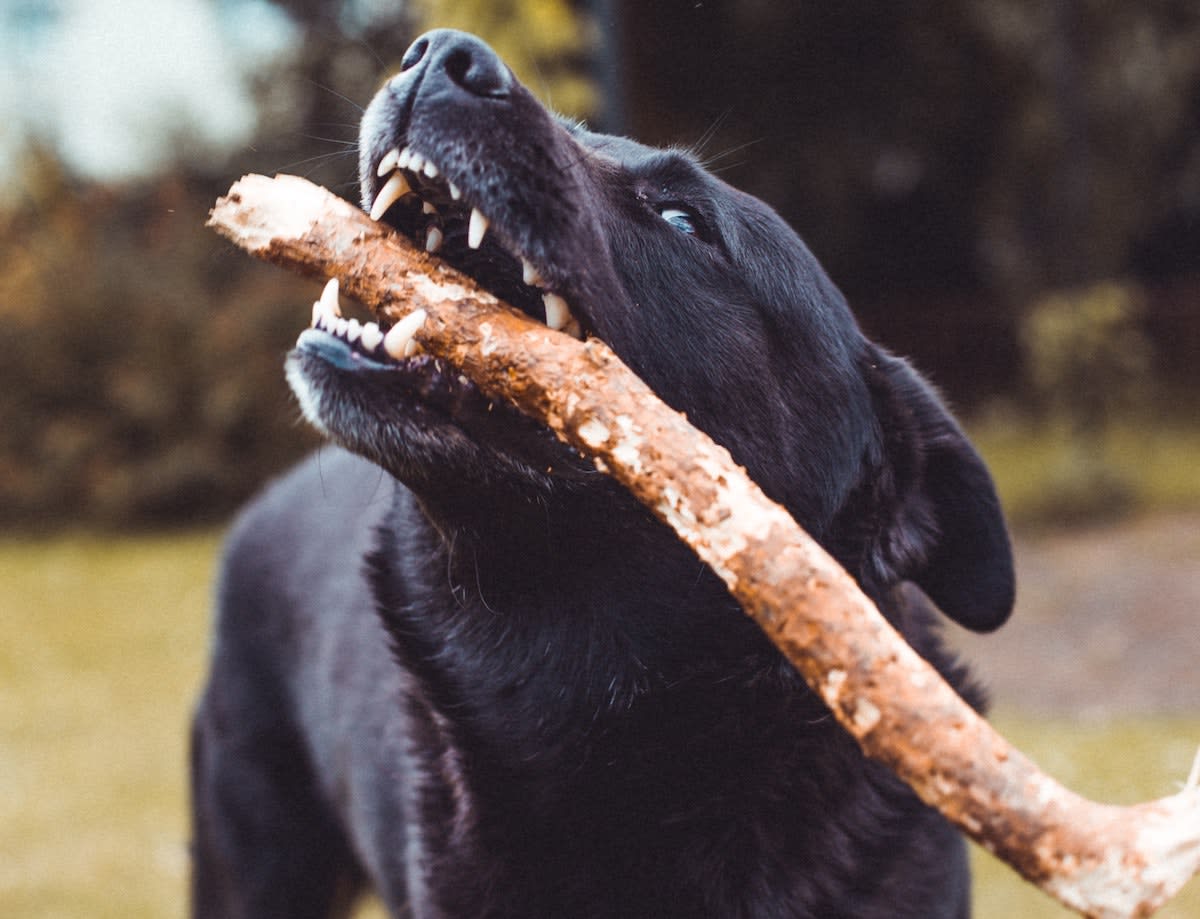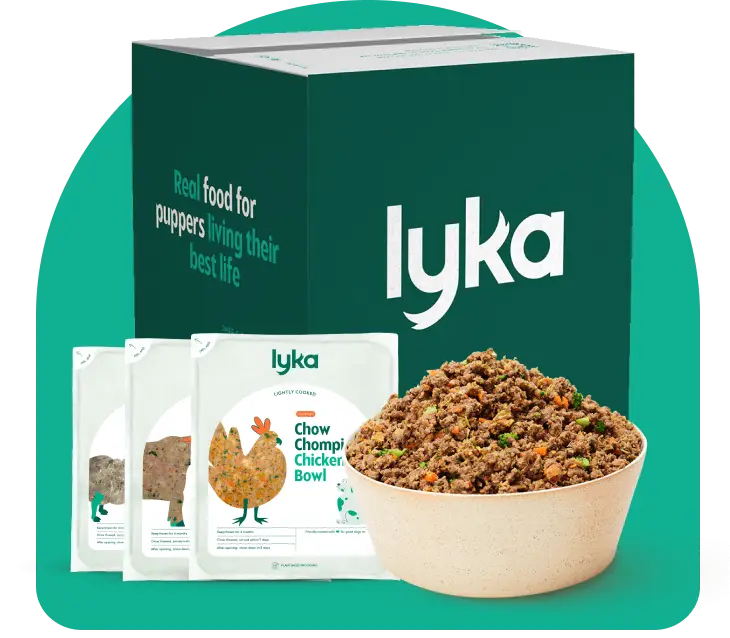Taking care of your dog's teeth
By Helene Mann

We love getting up close to our puppers, and they love it too. But when they go in for the nostril lick and you’re left with a stinky smell under your nose, you know their teeth need attention! There are lots of reasons for smelly breath, but the main cause is dental disease. In fact, 80% of dogs are showing signs of having dental disease by the time they’re 3 years old.
Why is it important to take care of your dog’s teeth?
Taking care of your dog’s teeth is very important not just for their teeth, but for their overall wellbeing – think of the mouth as the gateway to health! Healthy teeth for a pupper means being able to eat and play normally, without pain or discomfort. From sore gums and loose teeth to infection and even heart problems – the health of your pup’s teeth really impacts their quality of life.
So, what can happen to your dog’s teeth?
After eating, plaque starts to form on the teeth, which if not cleaned away regularly, builds up and hardens. Hardened plaque results in the formation of calculus (also called tartar) – and this can’t easily be brushed away. Calculus can lead to gingivitis, where the gums become infected and inflamed, and is the earliest stage of periodontal disease. Infection can develop further and damage caused by periodontal disease can be irreversible.
That’s why it’s important to keep teeth and gums clean and healthy, and to treat periodontal disease early.
Periodontal disease:
Can be very painful and impact your pupper’s quality of life
Can lead to tooth loss if not treated
Is thought to fatigue the immune system and studies in humans have even linked it to pancreatic cancer
Can lead to toxins and bacteria from gum infections spreading through the bloodstream and damaging other organs, such as the kidneys, liver and heart
Causes symptoms that make it difficult to eat, chew and play – sore gums, discoloured teeth and bad breath also aren’t very nice to cuddle up to, so can affect your human: pupper interactions
So be proactive about dental hygiene before issues emerge! A professional oral examination is the only way to detect evidence of early disease, so get a dental check from your vet every 6-12 months – even if your pup’s teeth seem healthy to you.

Should you give your dog bones?
Although bones can help satisfy your dog’s appetite and help prevent plaque build-up through chewing, they’re not always suitable for all dogs. For instance, if your dog tends to gulp food down, they’re more at risk of swallowing a piece of bone – and if it gets stuck on the way down to the stomach, it can cause serious oesophageal problems and require surgery.

As a guide:
Never feed cooked/smoked bones or raw beef weight-bearing bones – and avoid dried bones which generally contain lots of preservatives
For medium-sized dogs try turkey necks or lamb ribs, or try chicken necks for small dogs
Choking risks occur if dogs eat bones that are too small for them (for example, chicken wings are too small for a large dog) – a good rule of thumb is to make sure the bone is bigger than your pupper’s head
Always supervise your pup when eating a bone, and take it away once it gets too small to be safe
Don’t give your dog pig’s ears, as they have been linked to pancreatitis
Consult your vet before starting your dog on bones to get their advice. Vets, including holistic or integrative vets have more experience when it comes to keeping your dog safe – for example, your vet may advise against raw chicken bones due to the risk of APN, a disease which causes muscle weakness that’s been linked to campylobacter bacteria from raw poultry.
Our vet Dr Matthew Muir advises first discussing the risks and benefits of giving your dog bones with your vet. Then, only start offering a bone once your pup has eaten a 100% minimally processed, fresh food diet for more than a month – this helps ensure the acid level in the stomach is suitable to dissolve the bone.
Food plays a role in dental health too:
Complete and balanced fresh food, in combination with regular brushing and chewing aids and/or bones are the best way to keep your pupper’s teeth healthy.
And don’t think kibble is the answer! Because kibble is hard, it’s natural to think it may be doing their teeth some good, however that’s not the case! The high carbohydrate content in kibble forms a film on your pup’s teeth, which converts to sugar – and that leads to more plaque. Saying that kibble cleans teeth is like saying crackers clean our teeth!
Scientific evidence has debunked the idea that the crunch in kibble is good for teeth. The only varieties that may help your dog’s oral health are prescription-based, containing specialised fibres. Dr. Matthew Muir finds that whilst these products can help with teeth, they are not always associated with holistic health for the dog due to their high levels of Omega 6s and low Omega 3 content and glycemic load.
Other issues with kibble:
Small pieces can break off and lodge in your dog’s gums – leading to plaque building up around it and possible infection
The small benefit that special ‘dental’ kibbles may offer is outweighed by the weight gain, inflammation and potential negative impact on the microbiome that’s associated with them
The bottom line:
Multiple strategies, or ‘multi-modal dental hygiene’, usually work together to give the best outcomes when it comes to keeping your pupper’s teeth healthy. Prevention is key, as once periodontal disease develops it can reach the point of no return. So stick to healthy habits, persist if possible with brushing and feed your pup fresh quality food.
And don’t forget the regular dental check-ups – if your dog does need a periodontal treatment that involves a general anaesthetic, don’t be hard on yourself. Even with the best efforts, it’s common for pups to still need a professional dental clean from time to time.

Nothing beats Lyka for healthy eating:
Lyka ticks all the boxes when it comes to dental health.
Low carbohydrate content means less plaque build-up
Calcium: Phosphorus ratio is low to make it safe to feed bones a couple of times a week
Added kelp powder in Beef, Lamb and Chicken bowls which is great for keeping breath fresh
Try a Starter Box today!





